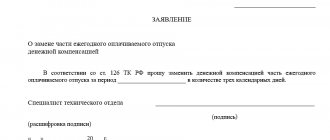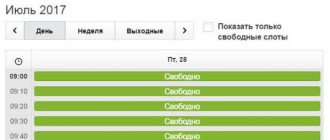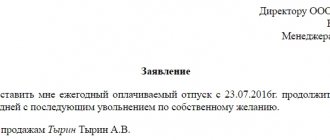In the course of its activities, each enterprise or organization resorts to the help of hired employees, and therefore an employment agreement (contract) is concluded between them:
- of an indefinite nature (the duration of the employment relationship is not specified);
- urgent nature, i.e. for a clearly defined period or to perform a specific amount of work.
Each type of contract has its own characteristics, including vacation payments, which the article will focus on.
General and special rules
In general, an employee who is hired on a fixed-term contract has the same holiday rights as anyone else. But there are two exceptions:
- If the term of the employment contract does not exceed 2 months (Article 291 of the Labor Code of the Russian Federation).
- If the employee is involved in seasonal work (Article 295 of the Labor Code of the Russian Federation).
In these cases, leave is granted at the rate of 2 working days for each month of work .
If both situations are not applicable to a “fixed-term” employee, then he is granted leave on a general basis.
Varieties
The above rules apply to the most common, annual, type of leave. In addition to this, an employee may need the following types of rest:
- additional;
- maternity leave;
- training.
If an employee is entitled to additional vacation days, under a fixed-term contract under the Labor Code of the Russian Federation they must also be taken into account. This should be done in proportion to the time of employment, that is, divide the required number of days by 12 and multiply by the number of months actually worked.
Maternity leave
The rights of pregnant employees are not limited in any way by the duration of the employment agreement. The employer will have to provide the woman with the required time after her request. It will be possible to cancel a contract with a subordinate only after giving birth.
It is important to know! During the maternity leave, the woman will have to provide a medical certificate confirming pregnancy. But it cannot be required more often than once every 3 months. The organization is not obliged to keep an employee’s place while caring for a child under 3 years of age if the agreement has expired before that time.
Training
Citizens of the Russian Federation can also receive study leave under a fixed-term employment contract. This time includes additional days for passing the session. If the exam period falls during the term of the agreement, the employer will need to release the employee. In the event that a subordinate voluntarily renounces the right to days off, monetary compensation is not required.
Fixed-term contract and vacation schedule
When drawing up a vacation schedule for the next year, a specialist may doubt whether to include “urgent” employees in it. Especially if the contract is for a period of less than a year.
The answer is simple - an employee on a fixed-term contract is included in the vacation schedule according to the general rules . Let us remind you that this schedule must be drawn up at least 2 weeks before the end of the year. And if at the time of planning vacations an employee is listed in the company, then it is impossible not to include him in the schedule. In addition, there is always a chance that the term of his contract could be extended. Or that the employee will move from the category of “urgent” to permanent. To avoid a controversial situation regarding your vacation later, it is better to foresee this in advance.
Employment contract for up to two months: important aspects
FEATURES OF AN EMPLOYMENT CONTRACT: EMPHASIS ON THE IMPORTANT
An employment contract for a period of up to two months can be concluded with an employee if two conditions are met :
• if the assigned work is temporary;
• at the time of signing the contract, it is known that this work will last no more than two months (Part 1 of Article 59 of the Labor Code of the Russian Federation).
Another feature is the absence for an employee when hiring (Part 4 of Article 70, Article 289 of the Labor Code of the Russian Federation).
If work for a given employer under a contract for a period of up to two months is the main one for the employee and its duration exceeds five days, the employer is obliged, as a general rule, to make a corresponding entry in the employee’s work book about the work. An exception is cases when a work book is not kept for the employee (Article 66.1 of the Labor Code of the Russian Federation).
Information about part-time work is entered into the work book at the place of main work at the request of the employee on the basis of a document confirming part-time work.
Employees who have entered into an employment contract for a period of up to two months may, within this period, be required, with their written consent, to work on weekends and non-working holidays . Work on such days is compensated in cash at least double the amount (Article 290 of the Labor Code of the Russian Federation). Thus, according to the norms of the Labor Code of the Russian Federation, in exchange for increased wages, an employee cannot receive an additional day of rest. Rostrud also speaks about this[1].
An employment contract concluded for a period of up to two months is terminated upon expiration of its validity period. of the termination of the employment contract due to its expiration at least 3 calendar days before his dismissal (Part 1 of Article 79 of the Labor Code of the Russian Federation).
If, at the end of the contract, none of the parties demanded its termination, and the employee continued to work, the condition on the fixed-term nature of the employment contract (a period not exceeding two months) loses force and such an employment contract is considered concluded for an indefinite period (Part 4 of Art. 58 Labor Code of the Russian Federation).
of his desire to terminate an employment contract concluded for a period of up to two months in writing at least 3 calendar days before dismissal (Part 1 of Article 292 of the Labor Code of the Russian Federation).
If an employment contract with an employee is terminated due to the liquidation of the organization, reduction in the number or staff of employees, the employer is obliged to warn the employee about the upcoming dismissal in writing against signature at least 3 calendar days in advance (Part 2 of Article 292 of the Labor Code of the Russian Federation).
RIGHT TO PAID LEAVE
Employees who have entered into an employment contract for a period of up to two months are provided with paid leave or compensation upon dismissal at the rate of two working days per month of work (Article 291 of the Labor Code of the Russian Federation).
If an employee has worked under a contract, for example, for 2 months, he must be provided with paid leave of 4 working days or appropriate compensation for unused leave.
If an employee has worked under a contract, for example, 1 month and 11 days, he should be given a vacation of 2 working days, since when determining the number of vacation days, surpluses amounting to less than half a month are excluded from the calculation. Surplus amounts of half a month or more are rounded up to the nearest full month[2].
The amount of vacation pay is calculated based on the employee’s average daily earnings (Article 139 of the Labor Code of the Russian Federation)[3]. The average daily earnings of an employee are calculated by dividing the amount of actually accrued wages for the period of validity of the employment contract by the number of working days according to the calendar of a 6-day working week (part 5 of article 139 of the Labor Code of the Russian Federation, clause 11 of Regulation No. 922).
An employee who worked under an employment contract for a period of up to two months will most likely not be able to exercise the right to leave during work. As a rule, leave is granted after the expiration of the contract and is formalized as leave followed by dismissal. The day of dismissal is considered the last day of vacation (Part 3 of Article 127 of the Labor Code of the Russian Federation). Payment of vacation pay is made no later than 3 calendar days before its start (Article 136 of the Labor Code of the Russian Federation)[4].
Cash compensation instead of vacation
An employee who has entered into an employment contract for a period of up to two months, upon dismissal, instead of vacation, has the right to receive monetary compensation, which is calculated in the same manner as vacation pay: based on the employee’s average daily earnings (Article 139 of the Labor Code of the Russian Federation, clause 11 of Regulation No. 922 ), as well as the number of days of unused vacation upon dismissal (Article 291 of the Labor Code of the Russian Federation, clause 35 of the Rules).
Payment of compensation is made on the day of dismissal of the employee, i.e. on the day of termination of the employment contract. If the employee did not work on that day, this amount must be paid no later than the next day after the dismissed employee submits a request for payment (Article 84.1, 140 of the Labor Code of the Russian Federation).
INSTEAD OF CONCLUSION
On the day of termination of an employment contract concluded for a period of up to two months, the employer must:
• issue the employee with a work book (if the work for this employer was the main one);
• or provide information about work activity (Article 66.1 of the Labor Code of the Russian Federation) with this employer;
• make calculations in accordance with Art. 140 Labor Code of the Russian Federation.
Upon written application by the employee, the employer is obliged to provide him with duly certified copies of documents related to work.
[1] Paragraph 5 of the Recommendations on compliance with labor legislation regulating the procedure for providing employees with non-working holidays, approved. at a meeting of the working group on informing and consulting employees and employers on issues of compliance with labor legislation and regulations containing labor law standards, protocol No. 1, dated 06/02/2014.
[2] Clause 35 of the Rules on regular and additional leaves, approved. People's Commissariat of Labor of the USSR 04/30/1930 No. 169 (as amended on 04/20/2010; hereinafter referred to as the Rules). They are used to the extent that they do not contradict the Labor Code of the Russian Federation.
[3] Also, the Regulations on the specifics of the procedure for calculating average wages, approved. Decree of the Government of the Russian Federation dated December 24, 2007 No. 922 “On the specifics of the procedure for calculating average wages” (hereinafter referred to as Regulation No. 922).
[4] Also letter of Rostrud dated July 30, 2014 No. 1693-6-1.
Duration of vacation
to 28 calendar days of vacation annually . But we are talking about employees who work on a permanent basis. In this regard, the question may arise: is it necessary to recalculate the length of leave for a “fixed-term” employee? For example, if a contract is concluded with him for 6 months, does this mean that he should be given a vacation of not 28, but 14 calendar days?
We answer: no, there is no need to recalculate anything . The Labor Code does not contain any guidance in this regard. Reservations are made only for seasonal workers and those hired for less than 2 months - we mentioned them above. All other employees on a fixed-term contract are entitled to a full 28-day vacation.
In accordance with Article 127 of the Labor Code of the Russian Federation, it is allowed to provide leave outside the term of the employment contract (vacation with subsequent dismissal). In this case, the day of dismissal will be considered the end date of the vacation. If the leave was provided in advance, then upon dismissal, the share corresponding to the unworked part is deducted from the salary.
Registration procedure
The hiring organization is often faced with the question of whether to include vacation for those working under a fixed-term employment contract in the general schedule. This should only be done if the contract continues into the next year. If an employee is invited for several months, rest is provided in agreement with management.
A citizen must notify 2 weeks in advance of his desire to exercise the right to rest. If approved, management must notify the employee of the decision at least 15 days before leaving. It is recommended to certify the fact of notification with the signature of a subordinate. If a citizen refuses to do this, this can be recorded in the presence of two witnesses.
Attention! Typically, in the case of short-term contracts, vacation followed by dismissal is used. Having worked for the agreed period, the employee receives payment and leaves. In this situation, the agreement will be terminated on the last day of rest.
If the employee wishes, the agreement can be terminated immediately. Then the unused days must be replaced with monetary compensation. This can only be done on the initiative of a subordinate or upon liquidation of the enterprise. Management does not have the right to impose the replacement of rest with money.
Vacation pay calculation
Next, we will consider two examples of calculating the amount of vacation pay: for special conditions of temporary work (seasonal or lasting less than 2 months) and for a regular “conscript”.
Seasonal work
The company hired I.I. Ivanov. for seasonal work lasting from July 1 to September 30, 2021 ( 3 months ) with a salary of 35,000 rubles per month. The employee worked throughout the entire period without missing a break. Vacation is granted after the end of the employment contract - the employee goes on vacation from October 1 with subsequent dismissal. The billing period is from July 1 to September 30, 2021 ( 78 working days ).
Let's calculate vacation pay:
- the duration of the vacation will be: 3 months * 2 working days = 6 days (Article 295 of the Labor Code of the Russian Federation);
- earnings amounted to 35,000 * 3 = 105,000 rubles;
- calculation of average daily earnings: 105,000 / 78 = 1,346.15 rubles;
- the employee is entitled to vacation pay in the amount of: 1,346.15 * 6 = 8,076.9 rubles.
Fixed-term contract for 12 months
Petrov P.P. was accepted under a fixed-term contract from August 1, 2021 to July 31, 2021 ( 12 months ) with a salary of 45,000 rubles per month. The entire period was worked without sick leave or vacation. From August 1, 2021, Petrov is granted leave with subsequent dismissal. Its length is 28 calendar days, since special conditions do not apply. The calculation period from August 1, 2017 to July 31, 2021 is used to calculate vacation pay.
Let's make the calculation:
- the employee’s earnings for the billing period were: 45,000 * 12 = 540,000 rubles;
- average earnings in this case are calculated as follows: 540,000 / 12 / 29.3 = 1,535.84 rubles;
- Petrov is entitled to vacation pay in the amount of: 1,535.84 * 28 = 43,003.52 rubles.
Circumstances requiring early leave
Circumstances obliging an employer to put an employee on vacation before the end of six months include (Labor Code of the Russian Federation):
- pregnancy - the provision of annual leave is linked to maternity leave and occurs immediately before or after it (Articles 122, 260);
- the employee is under 18 years of age (Articles 122, 267);
- adoption of a child (children) under the age of 3 months (Article 122);
- the fact that the husband expects his wife to give birth to a child during the period of maternity leave granted to her (Article 123);
- the presence of a disabled child under the age of 18 is important for one of the parents (guardians, trustees, foster parents) raising such a child (Article 262.1);
- the presence in a family of more than 2 children under the age of 12 years (Article 262.2);
- the fact of granting annual leave at the place of main work - for part-time workers (Article 286).
The right to grant leave at a time convenient for the employee is also enshrined in other regulations. For example, early rest time can be used by:
- spouses of military personnel (simultaneously with the leave granted to the spouse) - clause 11 of Art. 11 of the Law “On the Status of Military Personnel” dated May 27, 1998 No. 76-FZ;
- persons awarded the sign “Honorary Donor of Russia” - subclause. 1 clause 1 art. 23 of the Law “On Donation...” dated July 20, 2012 No. 125-FZ;
- persons exposed to radiation - clause 15 of Art. 2 of the Law “On Social Guarantees...” dated January 10, 2002 No. 2-FZ, paragraph 5 of Art. 14, clause 1, part 2, art. 15 of the Law “On Social Protection...” dated May 15, 1991 No. 1244-1
- disabled combatants of groups 1-2 - subp. 17 clause 1 art. 14 of the Law “On Veterans” dated January 12, 1995 No. 5-FZ;
- participants of the Second World War - subp. 13 clause 1 art. 15 of Law No. 5-FZ;
- combat veterans - sub. 11 clause 1, sub. 4 clause 2, sub. 3 p. 3 art. 16 of Law No. 5-FZ;
- military personnel of units that were not part of the active army during the Second World War, as well as military personnel awarded orders or medals for service during the Second World War - clause 9 of Art. 17 of Law No. 5-FZ;
- persons awarded the badge “Resident of besieged Leningrad” - sub. 9 clause 1 art. 18 of Law No. 5-FZ;
- persons who worked in the rear at defensive and military facilities during the Second World War - subclause. 10 p. 1 art. 19 of Law No. 5-FZ;
- Heroes of Labor (socialist and Russian Federation) and full holders of the Order of Labor Glory - clause 2 of Art. 6 of the Law “On the provision of social services...” dated 01/09/1997 No. 5-FZ;
- Heroes (USSR and Russian Federation) and full holders of the Order of Glory - clause 3 of Art. 8 of the Law “On the Status of Heroes...” dated January 15, 1993 No. 4301-1.
In other cases, the employer is not obliged, but may agree to grant early leave.
If vacation was not used
An employee becomes entitled to leave after 6 months of continuous work with a particular employer. Leave can be granted earlier, but this requires the consent of the employer. If an employee is hired for a short period of time, he usually does not have time to receive vacation. In this case, upon dismissal, he must be paid compensation for unused vacation days. The calculation goes like this: the average daily earnings and multiplied by the number of vacation days that the person did not use .
Here it is worth paying attention to the following point. As stated above, vacation pay for seasonal work and when hired for less than 2 months is considered in a special manner. In this case, compensation is calculated in working days . If we are talking about other “fixed-term” workers, then compensation is calculated in calendar days.
Important! The period of time actually worked does not play a role in this case. For example, if an employee was hired for 4 months, but only worked 1 of them, compensation still needs to be calculated in calendar days .
Compensation for days off work upon dismissal
Compensation payments upon dismissal can be received by all employees of the organization, regardless of the duration of the contract, therefore such provisions also apply to conscripts. The procedure for calculating compensation payments is identical to calculating the amount of vacation pay and amounts to a similar amount.
The conclusion of a fixed-term employment contract obliges the employer to comply with the established rules for providing leave for employees of the organization. The employer's reluctance to comply with labor law is a good reason to contact the Labor Inspectorate to check the legality of his actions.






